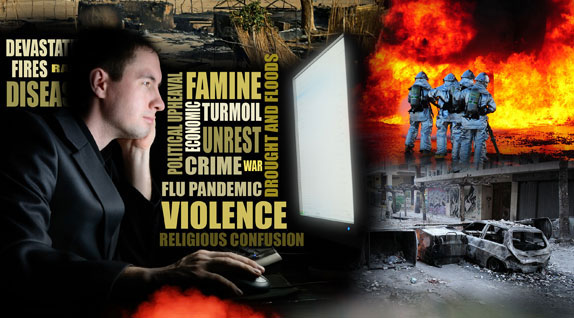 RCG illustration: Darnitra D. Jackson
RCG illustration: Darnitra D. Jackson
Article
Millions suffer fatigue from wave after wave of negative news stories. You can recognize the symptoms, and learn to resist them.
Learn the why behind the headlines.
Subscribe to the Real Truth for FREE news and analysis.
Subscribe NowIn a heartfelt appeal, UNICEF Executive Director Anthony Lake pleaded with the rest of the world: “I have read in the last few days a number of articles noting a decrease of interest in the Horn of Africa in the press and in the publics. This must not happen. We cannot let a kind of disaster fatigue set in…”
He warned of a looming “human catastrophe.”
“The statistics can be mind-numbing, but remember that the data is sons and daughters. The statistics are little boys and little girls, every one of them…”
 Raphael De Bengy/AFP/Getty Images
Raphael De Bengy/AFP/Getty ImagesWhile referring to a severe drought and famine crisis, which continues to threaten upward of 390,000 African children, Mr. Lake’s address on the UN World Humanitarian Day in 2011 is applicable to almost every negative news event today.
There seems to be no end to headlines about American tornado swarms, Syrian protests, Iran’s and Israel’s exchanged threats, West Africa’s drought, Mexico’s drug war, terrorist attacks, Europe’s economic crisis, antibiotic-resistant superbugs, political scandals, and the 2012 end-of-the-world frenzy. The list could go on and on.
With so much occurring, it can be easy for apathy or a false sense of security to set in—especially if one lives in an affluent nation.
Even during the current global economic crisis, many still enjoy relatively worry-free lives almost completely shielded from depressing news.
Others swamped with busyness may think they have no time to keep up with current events and assume that everything is just the “same old, same old.” This mindset tends to lead to tuning out bad news altogether.
 Shah Marai/AFP/Getty Images
Shah Marai/AFP/Getty ImagesDay in and day out, newspapers, television anchors, Internet sites, and radio talk-show hosts all seem to deliver an endless stream of bad news. And in the age of smartphones and wireless Web access, news alerts can find you anywhere and everywhere. The cacophony can be mind-numbing. It can leave you struggling to continue caring about the latest earthquake disaster, the young boys forced to be child soldiers in central Africa, the impoverished families in your city.
This is bad-news overload. And while it may seem impossible to stay abreast, there is a way to make sense of the madness.
Disaster Fatigue
First, realize that you are not alone. Mounting calamities have a way of shocking people’s ability to process them, resulting in what is called disaster fatigue.
“Experts say people may also go into denial and believe these tragedies will never happen to them, or they will channel their shock and horror into action and donate money, volunteer or help the cause in some other way,” ABC News reported.
 Adam Pretty/Getty Images
Adam Pretty/Getty ImagesBut disaster-relief efforts are definitely feeling the effects of a society suffering from bad-news burnout. In 2008, the year in which the ongoing economic recession showed its true face, charity organizations were hit hard, and donations plummeted.
“The numbers are almost too large to fathom, so many stop trying,” The Associated Press stated. “As bodies pile up in disaster after global disaster, even the most sympathetic souls can turn away. Charities know this as ‘donor fatigue,’ but it might be more accurately described as disaster fatigue—the sense that these events are never-ending, uncontrollable and overwhelming.”
Prolonged disaster fatigue eventually turns into overfamiliarity with bad news. Since every single negative news story does not automatically result in a crisis, anxiety often progresses into disinterest.
To illustrate this, consider the struggle of the United States National Weather Service in finding ways to ensure people take dangerous weather warnings seriously. According to The Associated Press, “…three out of every four times the National Weather Service issues a formal tornado warning, there isn’t one. The result is a ‘cry wolf’ phenomenon that’s dulled the effectiveness of tornado warnings, and one the weather service hopes to solve with what amounts to a scare tactic.
“In a test…five weather service offices in Kansas and Missouri will use words such as ‘mass devastation,’ ‘unsurvivable’ and ‘catastrophic’ in a new kind of warning that’s based on the severity of a storm’s expected impact. The goal is to more effectively communicate the dangers of an approaching storm so people understand the risks they’re about to face.”
Tuned-out Audience
Lacking basic understanding of world events, many others—especially young people—are vulnerable to another symptom of bad-news overload: obliviousness.
For decades, David T. Z. Mindich has seen this dangerous trend. In his book, Tuned Out: Why Americans Under 40 Don’t Follow the News, he stated, “Older Americans are still reading newspapers and have been doing it all their lives. But the generational shift is severe: While more than 70 percent of older Americans read a newspaper every day, a habit they picked up in their youth, less than 20 percent of young Americans do so now…It used to be that most 25-year-olds, and certainly 35-year-olds, followed the news. But for the past few decades, most have not. Eighty percent of young people don’t read the newspaper today, and there is no evidence that they will read 20 years from now, either. It would be less troubling if the 80 percent of young people who do not read newspapers every day watched TV news or logged on to news Web sites. Most don’t.”
Mr. Mindich highlights a sobering result: “While young Americans in past decades knew as much as their elders on a range of topics, this is no longer the case.”
The experience of a writer for The Australian proves Mr. Mindich’s worst fears might be a new reality: “The anniversary of the Christchurch earthquake reminded me that 48 hours after the disaster last year I asked my 17-year-old daughter, if she had any thoughts for her fellow Anzacs.
“She looked at me unknowingly.
“‘Are you aware,’ I said, ‘that your Kiwi brothers and sisters in the city of Christchurch have experienced a very serious earthquake which has devastated much of the city, and killed quite a number of its citizens?’ She continued to look at me quizzically.
“At this point I got angry. Not so much at her, but at the media life she leads. No newspapers, no evening news, no current affairs, no non-music radio, no…nothing that would provide a clue to any events that one would think should be of general interest.”
Not sure about his daughter’s ability to come out of her clueless state, the writer diagnoses, “She is a monomedia consumer. Facebook seemingly provides her with all she needs to know.”
Why Bother?
As bad news continues to increase, how do you feel? Do you feel fatigued—or tune out altogether?
Even if you have resolved to diligently stay informed with every subsequent event, you likely have still felt overwhelmed. “There is also a sense of head spin, of being unable to digest one tragedy before another happens,” Mail & Guardian Online stated.
The article added that this has become worse in the age of Twitter: “Stories are superseded so fast that you never get time for that half-knowledge to turn into full knowledge before the next thing happens. The effect is a news twilight, where you cannot even be sure what has been confirmed and what has not.”
Then there is the one story that gains steam and overpowers all others—sometimes for good reason, but often for no real reason at all—and is featured on seemingly every news website, magazine, newspaper and talk show on the planet. One can become frustrated having to sidestep it to find real news—all while it continues to mindlessly distract others. You may begin to feel as if you have been stricken with a sort of “News Attention Deficit Disorder.”
The barrage can leave you asking, “If no one can fix such problems, why even bother to keep up?” This may cause you to become apathetic and feel disengaged from the world altogether.
Shortly after Japan’s tragic earthquake and tsunami in 2011, ABC News stated: “Because of the multitude of world crises that have happened in a short period, people [may] also become desensitized to these events.”
Finding Meaning
There has always been devastating news: the September 11 attacks, atrocities during World War I and II, the Great Depression, the Great Potato Famine, the Bubonic Plague, and the Crusades, among others. Recent Dead Sea core data even suggests evidence of ancient devastating natural disasters comparable to modern mega-earthquakes.
“Looking farther back, one of the seismically active eras revealed by the core samples appears to have been about 4,000 years ago,” a researcher told National Geographic News. “‘If you believe the biblical chronology, this is roughly [the time of] Sodom and Gomorrah,’ he said. During this period, according to the Book of Genesis, God ‘rained fire and brimstone from heaven, and destroyed all.’”
Even the Bible accurately documents that for millennia, mankind has been unable to stop the tide of bad news.
Jesus Christ spoke of such a period of history in the book of Matthew: “…you shall hear of wars and rumors of wars…For nation shall rise against nation, and kingdom against kingdom: and there shall be famines, and pestilences, and earthquakes, in diverse [various] places” (24:6-7).
Christ’s description of this most tumultuous period of history came after His disciples asked Him what the world would look like at the end of the age (vs. 3). It is a time of war (think Afghanistan and Iraq)—rumors of wars (think Israel and Iran)—famine (think of the starving families in the Horn of Africa)—disease (think of constantly morphing antibiotic-resistant superbugs). In addition, think of all of the earthquakes across the globe—Haiti, Japan, Chile and so on.
This time described in Matthew 24 is occurring now. The Bible accurately describes the events happening today! (For more on this topic read Are These the Last Days?)
Yet Jesus’ answer did not stop with a simple description of bad news. A few verses later, He stated: “And this gospel of the kingdom shall be preached in all the world for a witness unto all nations…” (vs. 14).
While the terms found in this verse have been a source of heated debate among religionists, all you have to do is take this verse at face value. The word gospel means “good news” and the word kingdom can mean “government.”
Notice the Young’s Literal Translation version of this verse: “…and this good news of the reign shall be proclaimed in all the world, for a testimony to all the nations…”
Merriam-Webster Dictionary brings further clarity to the terms reign and kingdom:
- Reign: “royal authority: sovereignty…the dominion, sway, or influence of one resembling a monarch…”
- Kingdom: “a politically organized community or major territorial unit having a monarchical form of government headed by a king or queen…often capitalized…the eternal kingship of God…the realm in which God’s will is fulfilled.”
A related prophecy in the book of Isaiah states: “…and the government shall be upon His shoulder: and His name shall be called Wonderful, Counselor, The mighty God, The everlasting Father, The Prince of Peace” (9:6).
This is referring to Jesus Christ. He will reign on Earth over the coming kingdom. The next verse in Isaiah highlights that there will be no end to “His government and peace” and that His kingdom will be established “with judgment and with justice from henceforth even forever” (vs. 7).
While the Bible foretells the tumultuous period occurring today, more important, it describes the best news of all time: a soon-coming perfect government headed by God!
Stay Awake!
When properly understood, the good news found in the Bible reveals that the awful news happening today is not made up of senseless events. Still, the world is turning darker with each report of worsening news.
This can be likened to your body’s natural process of falling asleep. When the sun sets, your pineal gland begins to release a sleep-inducing hormone called melatonin into your bloodstream, which makes you feel less alert and go into “sleep mode.” This hormone, however, is inhibited in the presence of bright light. Its effect naturally goes away in the morning, or if you keep the lights on at night.
In the same manner, as the world continues to experience bad news—it gets darker in a sense—it will naturally be “lulled” to sleep. Most will not discern what is taking place around them. Instead, they will become drowsy with disaster fatigue.
Do not allow yourself to succumb to the tendency to tune out, stop listening, or forget what is occurring around you.
You can stop the media madness—and avoid bad-news burnout!
First, start by educating yourself about the very best good news beyond the negative news occurring today. (Read What Is the Kingdom of God? to learn more.)
Second, the Bible has much to say on news events happening today. Knowing why world events are occurring will give meaning to global trends and conditions.
David C. Pack, the foremost authority on biblical prophecy, wrote in The Bible’s Greatest Prophecies Unlocked! – A Voice Cries Out, “With all nations of Earth increasingly overwhelmed by a complicated and worsening array of difficulties confronting and challenging them, the greatest thinkers are being employed to find answers—solutions! The problem? There are no solutions to any of the world’s biggest problems anywhere on the horizon, but rather only new ideas that never seem to work!
“Of course, many are unmoved—not concerned—about the tumultuous events surrounding them, trusting that things will work out in the end ‘because they always do.’ Also believing things will eventually ‘turn out all right,’ others close their eyes, choosing to pursue pleasure and the accumulation of material goods at an even more frantic pace. But for the short term, things will not turn out all right. World conditions are and will become far more serious than any imagine.
“Almighty God will soon have to intervene and save humanity from itself. But before this occurs, world trouble will greatly increase—intensifying to staggering proportions. This will be followed by unexpected and cataclysmic events that will shake the whole world, affecting the life of every human being on Earth! Events are building to a final culmination—a tremendous climax! Nothing that has occurred over the past 6,000 years even remotely compares to what is yet to come upon this world! Civilization, as we know it, will change forever.”
You can defeat bad-news burnout!



